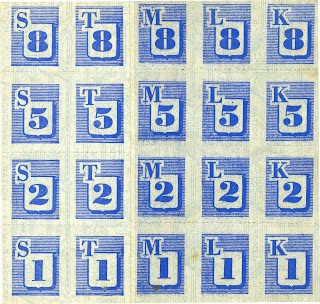 World War II had a big impact
on the availability of goods in the United States. As mentioned last week, citizens helped with
the war effort at home by collecting scrap metal to be recycled into materials
needed by the military.
World War II had a big impact
on the availability of goods in the United States. As mentioned last week, citizens helped with
the war effort at home by collecting scrap metal to be recycled into materials
needed by the military.
The government also placed rations
on food items. A large amount of canned,
package and processed foods were being used to feed the troops. As foods became scarcer, prices
increased. To aid in the demand for food
people across the country grew Victory Gardens.
 Locally businesses, club and schools were encouraged to grow their own Victory Gardens. County farm agents recommended a tenth of an
acre per family member. Ten or more
different vegetables that matured at different times from spring to fall were
advised. Gardeners were also encouraged
to grow berries and other fruits.
Locally businesses, club and schools were encouraged to grow their own Victory Gardens. County farm agents recommended a tenth of an
acre per family member. Ten or more
different vegetables that matured at different times from spring to fall were
advised. Gardeners were also encouraged
to grow berries and other fruits.
Harry Straus provided a garden plot for any employee who didn't have a garden at home. In 1943 it was reported that 1095 Ecusta employees planned to have Victory Gardens, 95 of those were on Ecusta property.
 Locally businesses, club and schools were encouraged to grow their own Victory Gardens. County farm agents recommended a tenth of an
acre per family member. Ten or more
different vegetables that matured at different times from spring to fall were
advised. Gardeners were also encouraged
to grow berries and other fruits.
Locally businesses, club and schools were encouraged to grow their own Victory Gardens. County farm agents recommended a tenth of an
acre per family member. Ten or more
different vegetables that matured at different times from spring to fall were
advised. Gardeners were also encouraged
to grow berries and other fruits. |
| A variety of stamps were issued to buy rationed items. |
The Ecusta Echo carried a monthly column offering planting advice and
gardening tips. In the fall, Ecusta held
an exhibition showcasing fresh fruits and vegetables, canned products and
flowers from employee’s gardens. Prizes
were awarded for quantity, quality and display.
In 1945 Ecusta won the
national Victory Garden Award Plaque for outstanding participation with 90% of
employees having gardens. The program
was in place for three years during the war. Victory Gardens were another way for people to
aid in the war efforts at home.
 |
| Cash & Carry Super Market on North Broad St. operated in the early 1940s. |
Food rationing and increases in gardening did have a negative impact on some businesses. In April 1943 Cash & Carry, a popular Brevard grocery store closed after just over two years of business. It was believed that effects of the war were partly responsible for its closing.
Next week Picturing the Past will look at the business that replaced Cash
& Carry.
Photographs and information for this column are provided by the Rowell Bosse North Carolina Room, Transylvania County Library. Visit the NC Room during regular library hours (Monday-Friday) to learn more about our history and see additional photographs. For more information, comments or suggestions contact Marcy at marcy.thompson@transylvaniacounty.org or 828-884-3151 x 242.
Photographs and information for this column are provided by the Rowell Bosse North Carolina Room, Transylvania County Library. Visit the NC Room during regular library hours (Monday-Friday) to learn more about our history and see additional photographs. For more information, comments or suggestions contact Marcy at marcy.thompson@transylvaniacounty.org or 828-884-3151 x 242.
Below: Book 4 stamps had military symbols on them. When using Book 4 stamps customers were able to receive "change" for purchases that were less than the value of the stamp. Previously they forfeited any extra value. The "change" consisted of red and blue cardboard tokens, valued at one-point each.




No comments:
Post a Comment